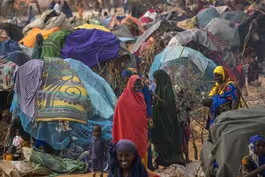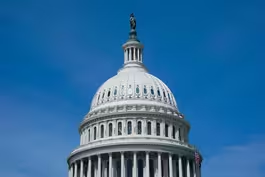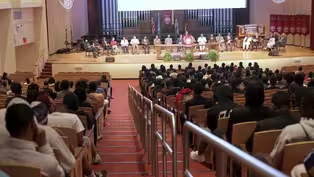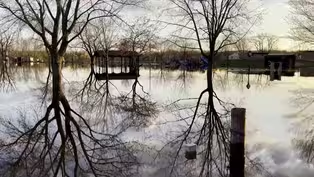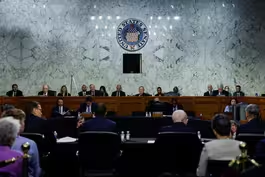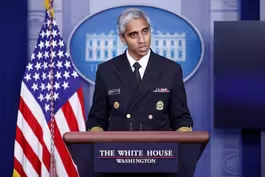
A Brief But Spectacular take on finding hope
Clip: 5/2/2023 | 3m 35sVideo has Closed Captions
A Brief But Spectacular take on finding hope in a difficult world
Simran Jeet Singh is executive director for the Aspen Institute’s Religion and Society Program and author of “The Light We Give: How Sikh Wisdom Can Transform Your Life.” Singh shares his Brief But Spectacular take on how by focusing on the positive aspects of our multi-religious, racial and ethnic world, society can disrupt bias and build empathy.
Problems playing video? | Closed Captioning Feedback
Problems playing video? | Closed Captioning Feedback
Major corporate funding for the PBS News Hour is provided by BDO, BNSF, Consumer Cellular, American Cruise Lines, and Raymond James. Funding for the PBS NewsHour Weekend is provided by...

A Brief But Spectacular take on finding hope
Clip: 5/2/2023 | 3m 35sVideo has Closed Captions
Simran Jeet Singh is executive director for the Aspen Institute’s Religion and Society Program and author of “The Light We Give: How Sikh Wisdom Can Transform Your Life.” Singh shares his Brief But Spectacular take on how by focusing on the positive aspects of our multi-religious, racial and ethnic world, society can disrupt bias and build empathy.
Problems playing video? | Closed Captioning Feedback
How to Watch PBS News Hour
PBS News Hour is available to stream on pbs.org and the free PBS App, available on iPhone, Apple TV, Android TV, Android smartphones, Amazon Fire TV, Amazon Fire Tablet, Roku, Samsung Smart TV, and Vizio.
Providing Support for PBS.org
Learn Moreabout PBS online sponsorshipAMNA NAWAZ: Simran Jeet Singh is executive director for the Aspen Institute's Religion and Society Program and author of the book "The Light We Give: How Sikh Wisdom Can Transform Your Life."
Tonight, Singh shares his Brief But Spectacular take on how focusing on the positive aspects of our multireligious, racial and ethnic world can disrupt bias and build empathy.
SIMRAN JEET SINGH, Executive Director, Aspen Institute Religion and Society Program: I was a senior in high school, and the fall semester had just started.
And I heard whispers, rumors that there was a terrorist attack in New York City.
And we all stood there and watched the news.
They mentioned the name of Osama bin Laden.
I hadn't heard it before.
And then they showed an image of him, and his turban and his beard as brown skin.
And, as I saw him, my heart sank.
I knew that my life would change forever.
And the death threats started that day.
Not many people believe this when I tell them, but I was born and raised in San Antonio, Texas.
And, in a lot of ways, it was wonderful.
We saw our lives as very typical, always playing sports outside or riding our bikes or playing our video games with neighbors.
And, in some ways, our lives were very atypical.
And people on the streets or in grocery stores would remind us that they didn't feel like we belonged.
I was 10 years old the first time someone called me a terrorist.
I was at a soccer game.
The referee was doing equipment checks, making sure we had our shin guards and our cleats on.
And when he got to me, he said something about how he needed to check my turban and called me a terrorist.
And he said that he knows that people like me like to hide bombs and knives in our headwear.
And so I put my head forward and let him touch my turban.
And no one had done that before.
I felt like I was giving in to somebody's racism.
And, after that moment, I promised myself that, next time I'm in a situation like this, I'm going to stand up for myself.
And I just started to think about, what does it look like for us to engage with the challenges in our lives in ways that make us feel proud, and that we didn't run away, but also didn't inspire or amplify the anger in our hearts?
In these moments of violent racism, or even in the small moments of daily bigotry, I stop and I ask myself, how in this situation can I practice my values of oneness and love and service?
How do we really love our neighbor as ourselves?
We, in this country, do a very poor job of learning about one another and learning to live alongside difference.
Growing up in public schools in Texas, I didn't really learn about the cultures.
I didn't learn to appreciate them.
I belong to the world's fifth largest religion.
And there are about 30 million Sikhs around the world.
And yet 70 percent of Americans don't know who they are, they don't know who I am.
And, when they see me, they make all sorts of assumptions that have nothing to do with my faith or my background.
"The Light We Give" is a book what it's like to be different in this country, drawing from the Sikh tradition and Sikh teachings.
We fear what we don't know.
And part of the antidote to that is to create literacy, so that we know one another, we can respect to one another, and we can appreciate one another.
It's a simple step that we can all take, but it can make a really big difference.
My name is Simran Jeet Singh, and this is my Brief But Spectacular take on finding hope in a difficult world.
AMNA NAWAZ: And you can find more Brief But Spectacular videos online at PBS.org/NewsHour/Brief.
Cindy McCain on new role as head of UN World Food Programme
Video has Closed Captions
Clip: 5/2/2023 | 7m | Cindy McCain on her new role as head of the UN World Food Programme (7m)
Debt negotiations become urgent as limit could hit in weeks
Video has Closed Captions
Clip: 5/2/2023 | 8m 14s | Debt ceiling negotiations become urgent as Treasury says the U.S. could hit limit in weeks (8m 14s)
New initiative aims to boost graduation rates at HBCUs
Video has Closed Captions
Clip: 5/2/2023 | 6m 59s | New initiative aims to boost graduation rates at historically Black colleges (6m 59s)
Parts of Mississippi River seeing worst flooding in decades
Video has Closed Captions
Clip: 5/2/2023 | 3m 35s | Communities along Mississippi River struggle with highest floodwaters seen in decades (3m 35s)
Senate holds hearing on Supreme Court ethics
Video has Closed Captions
Clip: 5/2/2023 | 8m 35s | Senate probes Supreme Court ethics after questionable financial dealings by justices (8m 35s)
Surgeon General discusses the health risks of loneliness
Video has Closed Captions
Clip: 5/2/2023 | 8m 9s | Surgeon General discusses health risks of loneliness and steps to help connect with others (8m 9s)
Providing Support for PBS.org
Learn Moreabout PBS online sponsorship
- News and Public Affairs

FRONTLINE is investigative journalism that questions, explains and changes our world.

- News and Public Affairs

Amanpour and Company features conversations with leaders and decision makers.












Support for PBS provided by:
Major corporate funding for the PBS News Hour is provided by BDO, BNSF, Consumer Cellular, American Cruise Lines, and Raymond James. Funding for the PBS NewsHour Weekend is provided by...
